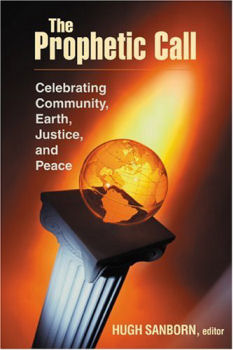
|
Posted October 10, 2005
Book: The Prophetic Call: Celebrating Community, Earth, Justice, and Peace Editor: Hugh Sanborn Chalice Press, St. Louis, MO, pp. 206 An Excerpt from the Jacket:
The Prophets as Challengers of Authority - John Bullard The Failure of Community - Sharon G. Thornton Building Authentic Faith Communities - Ismael Garcia A Prophetic Vision of Building Worldwide Community Charles McCollough Becoming a Church for Ecology and Justice - Dieter T. Hessel A Prophetic Vision of Restoring the Earth - David W. Randle Issues of Injustice in the Church and Soociety - Cynthia Bowman Building a Peacemaking Church - Jay Lintner A Prophetic Vision of Establishing Worldwide Peace - Hugh W. Sanborn An Excerpt from the Book: Intellectual A year into the U.S. war against the Taliban and Al Qaeda, a freshman Congressman uttered a revealing remark. He had been “surprised,” he said, to learn that “people from other countries have different values than we do.” He had always thought that other people were “just like us.” Unfortunately, this reflects geographical and cultural illiteracy that are characteristic of our culture. With 10 percent of U.S. people having been born abroad, we do not need to travel far to find people who can teach us about other cultures and the wider world. Another approach is to get a passport, travel, see, and listen. A recent visitor to Berlin learned an encouraging lesson from his experience there. “Berliners of all ages,” he wrote, “leave an indelible impression of broadly humanistic and progressive values. . .many Germans. . .have responded to Nazism and its legacy. . .with an indivisible commitment to oppose all forms of oppression.” The Germans had changed so much in fifty years was not an accident of history; it was largely the consequence of the combination of international pressure and the struggle of conscientious intellectuals who honored their fundamental responsibility: naming reality, imagining alternatives, and working to bring them to fruition. We have many models for such integrity in the United States. At the height of the Cold War, C. Wright Mills challenged intellectuals to examine their co-optation and their roles in preparing the world for a nuclear World War III. He inveighed upon his peers to “fight against the doctrine that . . .there are no alternatives. . .We should take democracy seriously and literally. . .We must,” he urged, “attempt to educate, and then again to impute responsibility. . .we must reveal by our work the meaning of structural trends and historic decisions . . .we must state what we have found out concerning the consequences of the decisons of the high and the might.” Confronting what Senator William J. Fulbright called the failure of scholars “who ought to be acting as responsible and independent critics of the governments’ policies but who instead becme the agents of these policies.” Noam Chomsky skewered the “mandarins” of the U.S. imperial establishment. In American Power and the New Mandarins, he described how, as U.S. intellectuals achieved the status of a doubly privileged elite, the “inequities of society” recede from vision. Chomsky wrote that, “It is the responsibility of intellectuals to speak the truth and to expose lies.” Chomsky modeled such teaching by deconstructing and rewriting histories of the Spanish Civil War and the U.S. invasion of Vietnam. The nation’s intellectual life begins in elementary and secondary schools that increasingly resemble the rigid class hierarchies and undemocratic values of the Pakistani educational system. Elite private schoos serve the wealthy and the fortunate few who win scholarships and then must navigate the shoals of alienation on a daily basis. Public schoos in U.S. cities and rural areas are often woefully underfunded and frequently lack essentials: books, paper, and dedicated and well-educated teachers. Finally there are the U.S. versions of madrassas – religious schools tht inculcate fundamentalist and authoritarian values. Even in many U.S. public schools, religious fundamentalists, like the Taliban, seek to prohibit the teaching of evolutionary science. Democratic alternatives have long been known. They begin with ample funding for public education and move through updated and multicultural versions of the pedagogy described by John Dewey in Experience and Education. Dewey understood that teachers should be constantly re-creating learning environments to provide opportunities for learning and openings for engagement with a variety of aspects of the subject at hand. While urging structured flexibility, Dewey insisted on honoring the continuity of learning, building on what is known, and has captured the learner’s interest. |
|
